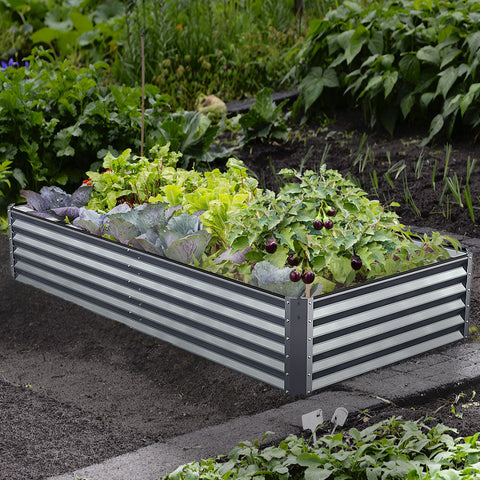Growing healthy and productive tomato plants is every gardener's goal. However, aphids on tomato plants can quickly turn this dream into a nightmare. These tiny pests can wreak havoc on your tomato plants, leading to reduced yields and plant damage. But fear not, there are effective ways to prevent and combat aphid infestations.The following content also has some reference value for raised garden beds.
Taking precautions is essential to protect your tomato fruit from a full-blown aphid infestation. To prevent aphids, you can plant in groups, introduce natural enemies, or use organic methods.
Aphids can cause significant damage to tomato plants by destroying their soft tissues, stunting growth, or spreading disease. Severe aphid infestations can lead to frizz, yellowing of leaves and reduced yields. Aphids also transmit plant viruses, such as Mosaic and leaf roll viruses. To protect your tomato plants from aphids, you can adopt companion planting, introduce natural enemies, or use organic methods such as diatomaceous earth or neem oil treatment.
One of the first ways to solve the tomato aphids problem is to spray the aphids with water. This method is very effective, but you must ensure that all the leaves are thoroughly covered. Spray once or twice a week.
Introducing beneficial insects such as ladybugs, lacewings, praying mantises, and hover flies can help control aphids. These predatory insects feed on aphids and help control their population. By attracting these natural predators to your garden, you can reduce the need for chemical pesticides and maintain a healthier ecosystem.
By fostering a garden environment that supports beneficial insects, you can achieve a more natural and sustainable approach to aphid control. These insects not only help control aphid populations, but also promote overall garden health by pollinating plants and controlling other pests.
Organic way to get rid of aphids
For gardeners who prefer organic solutions, there are several effective ways to combat aphids, including pairing plants with herbs and flowers, using diatomaceous earth and neem oil treatments. Each of these methods provides a natural and environmentally friendly way to control aphid infestations while maintaining the health and vitality of tomato plants.
Companion planting is a gardening technique in which different plants are planted together to improve the overall health of the garden. Certain companion plants can help reduce the likelihood of aphid infestations on tomato plants, while also attracting beneficial insects that can more effectively control the aphid population. Companion plants that can protect tomatoes from aphids include calendula, nasturtium, mint, pansy and coriander.
Planting herbs and flowers on tomato plants is an effective way to control aphids. It would also attract local predatory insects. This approach not only helps prevent aphids, but also helps build a more biologically diverse and healthy garden ecosystem.
The establishment of a complete beneficial insect and pollinator garden is a necessary condition for long-term pest control. By combining a variety of plants that attract and support beneficial insects, you can create a more resilient and balanced garden environment that is naturally resistant to aphid infestations.
Diatomaceous earth is a white powder made from crushed fossils that abrades the soft skin of aphids. When applied to affected plants, it can Pierce their skin, causing dehydration and eventually death. This makes diatomaceous earth an effective and natural way to control aphid populations. 
Some gardeners are concerned that the use of diatomaceous earth may have adverse effects on bees and other beneficial insects. To minimize any potential harm, be careful to apply the powder only to the affected plants and avoid areas where beneficial insects are known to be active.
All in all, aphids can pose a serious threat to the health and productivity of tomato plants. By identifying aphids early, understanding their effects, and using a combination of beneficial insects, organic methods, preventive measures, and ongoing management, you can effectively protect your tomato plants from these destructive pests.
As gardeners, we have a responsibility to maintain healthy, vibrant gardens that not only produce delicious fruits and vegetables, but also support a diverse ecosystem of beneficial insects and wildlife.









